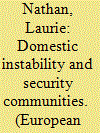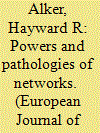| Srl | Item |
| 1 |
ID:
071782


|
|
|
|
|
| Publication |
2006.
|
| Summary/Abstract |
The problem of political instability is neglected in the literature on security communities. In this article I argue that domestic stability, defined as the absence of large-scale violence in a country, is a necessary condition of these communities. Domestic violence precludes the existence of security communities because it renders people and states insecure; it creates the risk of cross-border destabilization and violence; and it generates uncertainty and tension among states, inhibiting trust and a sense of collective identity. I conclude that the benchmark of a security community-dependable expectations of peaceful change-should apply as much within states as between them. This is consistent with the work of Karl Deutsch, whose pioneering concept of a security community is widely understood to mean the absence of interstate war. Deutsch, in fact, was equally concerned with large-scale internal violence.
|
|
|
|
|
|
|
|
|
|
|
|
|
|
|
|
| 2 |
ID:
105953


|
|
|
|
|
| Publication |
2011.
|
| Summary/Abstract |
This article reconstructs Karl Deutsch's fearful yet hopeful views about the powers and
pathologies of military, and other, national and international network systems. These
views presuppose Norbert Wiener's Cybernetic Interpretive Hypothesis: that 'society
can only be understood through a study of the messages and communication facilities
which belong to it'; that the societal trend is towards more computerized communication
systems; and that they embody an 'open vs. closed' living systems ethos. Drawing on
science and technology studies by Edwards and Mirowski, the author suggests how
Deutsch's and Wiener's prophetic hopes, fears, and insights can also enrich and redefine
contemporary debates about the historical-technological development of our national
societies, the powers and pathologies of game-theoretically programmed computer
networks, the assessment of the life-preserving potential of our partly automated
security systems, the major threats from the continued poverty of the less developed
world, problems of decentralized governance, and the political, ethical, and religious
justifications for our national, international, and civilizational identities and purposes.
|
|
|
|
|
|
|
|
|
|
|
|
|
|
|
|